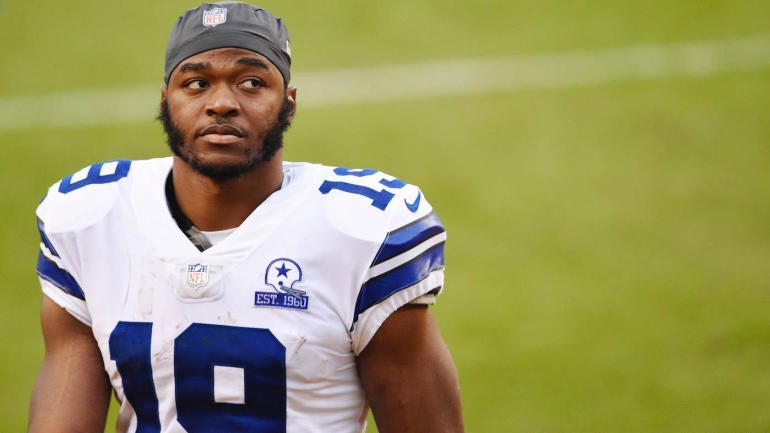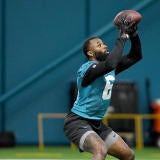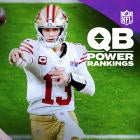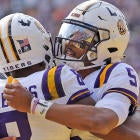
Everything said or not said by the Dallas Cowboys front office is with a very pointed reason, and they've now aimed that strategy at Amari Cooper and DeMarcus Lawrence, with head coach Mike McCarthy having been a recent recipient of the tactic. The offseason began with speculation regarding the future of both Pro Bowlers in Dallas, and while the team's stance hasn't changed regarding wanting both to remain on the roster in 2022 -- sources told CBS Sports in mid-February -- how that ultimately looks might be different, from a contractual standpoint.
With the team currently more than $21 million over the NFL salary cap, they'll have to do some finagling to not only limbo beneath it, but to also free up money for potential re-signings and/or a franchise/transition tag (e.g., Randy Gregory, Dalton Schultz), and that's where Cooper and Lawrence come into the picture. Collectively, they're set to hit the Cowboys salary cap in 2022 for $49 million, if allowed, and team executive Stephen Jones has opted to take a measured yet neutral stance on the matter to begin the month of March.
"It's too early for me to address [the future of Amari Cooper in Dallas] yet," Jones told media from the 2022 NFL Combine in Indianapolis. "We're continuing to have conversations. A lot of things affect that in terms of -- we've obviously been so fortunate to have those three great receivers on our roster, and obviously that's hard to keep doing under a salary cap. Certainly Ced[rick Wilson] did a really nice job for us. He's up.
"There's some moving parts to that that we'll have to continue to massage as we move forward."
Another one of those "moving parts" is Michael Gallup, who wants to remain in Dallas -- at the added behest of quarterback Dak Prescott -- but also wants fair compensation to do so, while also being willing to play under a "prove-it" deal (if necessary), as he now works to return from a torn ACL suffered in late December. And despite the fact Cooper's salary for 2022, amounting to $20 million, becomes fully guaranteed on March 22, Jones believes there is plenty of time to hash out the situation; and it's one that involves the WR whose trade saved Prescott and the offensive scheme from their wildly unsuccessful "WR by committee" approach in the wake of releasing Dez Bryant.
"I think it's a little early in my opinion," he reiterated. "You come [to the NFL Combine] with an agenda wanting to get a lot done. ... I mean, I bet we're going to meet with over two dozen agents. But, still, people are just feeling it out. You come hoping you might get some things done, but usually we're still a little early yet."
He's also applying the same logic to Lawrence, who returned from a broken foot in early December to play some of his best football ever as a Cowboy, both as a pass rusher and as a run defender -- a combo package that doesn't grow on trees.
"Same thing," said Jones. "I mean, we go through every player on our roster. I know you guys want to make target guys that you may be looking at and usually those are the guys who are making a lot of money. And, so, that's what comes with making money, unfortunately, is the value there. And certainly we'll work through that.
"We're talking about two great football players in DeMarcus Lawrence and Amari Cooper. I hold them up here in terms of what we think about them. But we also have to put the full 53-man roster together."
Of course, none of this is earth-shattering when you consider the source, also one who was openly and publicly critical of [a frustrated] Cooper's downturn in production to end the season but, on Monday, noted it was the system run by offensive coordinator Kellen Moore that factored into it.
"I just think it's an offensive philosophy," said Jones. "And when we had the skill players that we had between Kellen [Moore] and Dak, there was a progression of where you threw the ball. And depending on how the defense played you, it would point the ball to certain places where, hey, if they're going to double over and they're going to double over the top over here, that's going to dictate the ball goes here.
"So, I think it's more of a system deal. It wasn't a thing where we said, hey, we're not going to target Amari as much."
This is the literal definition of the colloquialism that someone is "talking out of both sides of their mouth," by the way.
Jones has routinely been proactive in attempting to leverage the salary cap against players, and it hasn't yielded him much more than lost time and a higher cost in recent years. An initial contract standoff with Lawrence eventually led to him landing a record-setting contract when Jones made it clear the Cowboys were not interested in setting the market at positions, then doing so yet again with two-time rushing champ Ezekiel Elliott ... and yet again with Prescott in 2021 (also awarding Cooper a five-year, $100 million deal two years ago).
That is to say while he and the Cowboys will also point at how many slices of pie are on the table, the fact remains the size of the table increases annually. A raging pandemic notwithstanding, the NFL salary cap usually enjoys a sizable bump on a year-to-year basis, and this year teams will see it jump nearly $20 million to $208 million in 2022, and to a much higher shelf in 2023, so forth and so on. Even Jones has to admit this inevitability, particularly when you add the influx of billions in new TV and gambling revenues for the NFL in years to come.
"I think it will go up," he admitted, before again grabbing onto his leverage as it attempted to fly out of the window in real time. "I think it will go back to where it was, but we obviously, you know, with the pandemic it pushed it back. That affected a lot of contracts in this league that were done based on things being status quo before the pandemic."
The added problem here being Jones hasn't, at least publicly, acknowledged there's a new status quo because of the COVID-19 pandemic -- one that has seen teams pivot to using void years on the back ends of contracts to spread cap hits more effectively, as one example of how the cap can be easily massaged. Another example would be in how a simple restructure of both Cooper's and Lawrence's deal could net the Cowboys roughly $25 million in added cap space, without costing them a top talent they'd then have to get to work trying to replace versus focusing on other high-end tasks in free agency and the 2022 NFL Draft.
Things to consider, heavily, along with the fact the Cowboys don't actually need gobs and gobs of cap space for free agency because they are never major players in it anyway, instead often rolling over millions into the next year's cap.
And speaking of Elliott, unlike the air around Cooper and Lawrence, Jones was downright committal to the team's franchise running back being on the roster in 2022, who also played through a torn PCL in his knee in 2021.
"I want Zeke on my team," Jones said firmly. "You talk about playing through some injuries and things that are hard. I mean, he is a competitor. I think he is a damn good running back. I think he's going to help us win this year."
This fiery commitment to Elliott isn't unexpected when you consider the financial malpractice required to try and part ways with him.
"Obviously his contract, his money is guaranteed, he's going to be here," said Jones. "There's no question. So, and we're fortunate to have him."
Time will tell how it all shakes out with Cooper and Lawrence, but one thing is already and always true: the political way of word hustling in Dallas regarding player contracts is neither new nor groundbreaking. The only difference is it's now aimed at Cooper and, for the second time in less than three years, their All-Pro pass rusher.






















